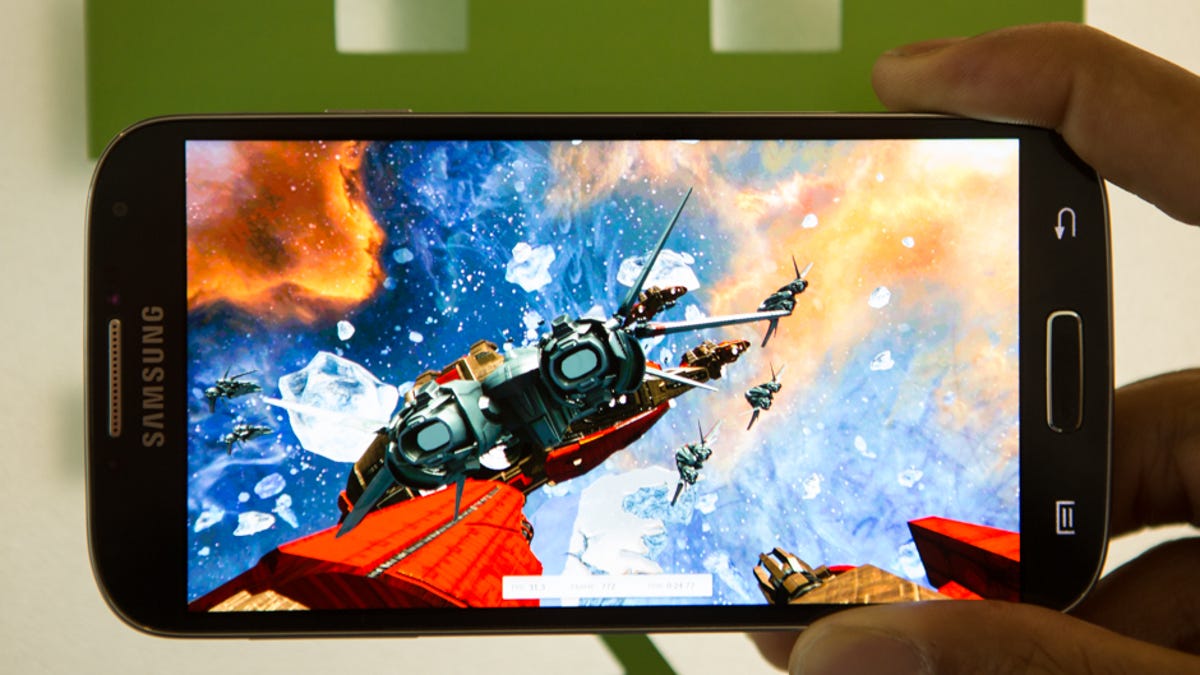Samsung Galaxy S4 has the fastest gaming graphics of any phone
With the latest version of Qualcomm's Snapdragon 600 processor, the Galaxy S4 catapults itself to the top of the smartphone gaming heap.

The Samsung Galaxy S4 is the latest mobile graphics prodigy, and while our full review will answer whether it's ultimately worth your money, I'm personally more interested in just how adept its highly advanced internals are. Namely at producing real-time, polygonal, video-game graphics. (Spoiler alert: as smartphones go, it's currently the best at doing this.)
To determine this, I used two different tools: Futuremarks' 3DMark and Kishonti's GLBenchmark 2.7. Each is a synthetic real-time graphics benchmark designed to stress each device's Graphics Processing Unit (GPU).
The setup
OK, these aren't results, but knowing the specs of each of the devices in question is important when putting their results in context. While the GPU is the most important component when rendering complex polygonal graphics, CPU speed, RAM, and the underlying OS also play big parts.
| Device | CPU | GPU | RAM | OS tested |
|---|---|---|---|---|
| Samsung Galaxy S4 | 1.9GHz quad-core Qualcomm Snapdragon 600 | Qualcomm Adreno 320 (single-core) | 2GB | Android 4.2.2 |
| Samsung Galaxy S3 | 1.6GHz quad-core Samsung Exynos 4 Quad (4412) | Mali-T400MP4 (quad-core) | 1GB | Android 4.1.1 |
| Apple iPad 4 | 1.4GHz dual-core Apple A6X | PowerVR SGX554MP4 (quad-core) | 1GB | iOS 6.1.3 |
| Google Nexus 10 | 1.7GHz dual-core Samsung Exynos 5 Dual (5250) | Mali-T604 (quad-core) | 2GB | Android 4.2.2 |
| Apple iPhone 5 | 1.3GHz dual-core Apple A6 | PowerVR SGX543MP3 (triple-core) | 1GB | iOS 6.1.3 |
| HTC One | 1.7GHz quad-core Qualcomm Snapdragon 600 | Qualcomm Adreno 320 (single-core) | 2GB | Android 4.1.2 |
The tests
3DMark's mobile platform test is called Ice Storm and depicts a sci-fi spaceship battle over an ice planet. The 3DMark score is derived from the results of three different tests: two graphics tests made to stress the system's GPU, and one physics test focusing on CPU performance. The tests can be run at both 1,280x720-pixel resolution with normal textures and post-processing (partical effects, highlights, etc.) or at 1,920x1,080 with higher quality textures and post-processing effects. The images are then scaled to the device's native resolution with virtually no performance overhead. Check here for more information on 3DMark.
GLBenchark 2.7 is quite similar in concept; however, the test I've run depicts a motorcyclist being chased by a T. rex through a jungle. The test is run both at the device's native resolution and at a resolution of 1,920x1,080. The test appears to be a lot more taxing than 3DMark.
And now, the results (really!)
The 3DMark score in the first chart is not a unit of measure, but is instead derived using a weighted harmonic mean from both the graphics and physics scores combined, with a higher score indicating faster performance and higher frame rates. The two charts below are presented in frame-per-second.
As you can see, in 3DMark the GS4handily wipes the floor with the GS3, while also beating out the fastest Android tablet, the Nexus 10. The GS4 just squeaks by the HTC One, which is a bit surprising. While each phone houses a Snapdragon 600 with same CPU and GPU model, the one in the GS4 is 200MHz faster than the chip in the HTC One.
What we're probably seeing here is evidence that, with all else being relative, (virtually identical specs on the HTC and GS4), a 200MHz increase from the HTC One's 1.7GHz CPU, just isn't significant enough make a huge difference in graphical performance. The bottleneck likely lies elsewhere, possibly the speed and amount of RAM; however, it can't be said for certain without more testing.
With all devices running at 1080p, GLBenchmark results show the GS4 tied for fastest smartphone, with the iPad 4 edging it out just a bit. The GS4 also beats the iPhone 5 in dramatic fashion. With the devices running at their native resolution, the iPad 4 takes a bit of a tumble and the iPhone 5 -- running at its lower native resolution of 1,136x640 -- makes up some ground, yet the GS4
| Device | Resolution |
|---|---|
| Samsung Galaxy S4 | 1,920x1,080 |
| Samsung Galaxy S3 | 1,280x720 |
| Apple iPhone 5 | 1,136x640 |
| Google Nexus 10 | 2,560,1,600 |
| HTC One | 1,920x1,080 |
| Apple iPad 4 | 2,048x1,536 |
The takeaway
It's clear: when it comes to advanced gaming graphics, the Samsung Galaxy S4 is the leader of the smartphone pack, if just barely ahead of the HTC One.
For those of us whose interest leans a bit farther to the geeky side, I think the interesting takeaway is that the extra 200MHz in the GS4's CPU fails to offer any clear performance benefits for gaming graphics. My theory is this: at that level, with that processor, the memory becomes the bottleneck. And in this case, the processor is simply waiting around for the memory to deliver the data it requires to continue performing computations. I can't yet say for certain however.
Still, no matter your level of interest, if you're planning to pick up the Samsung Galaxy S4, you can rest assured that you'll be experiencing the very best that smartphone gaming currently has to offer. Check out the full review for a complete evaluation.

